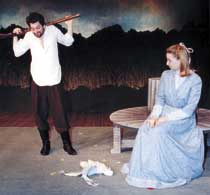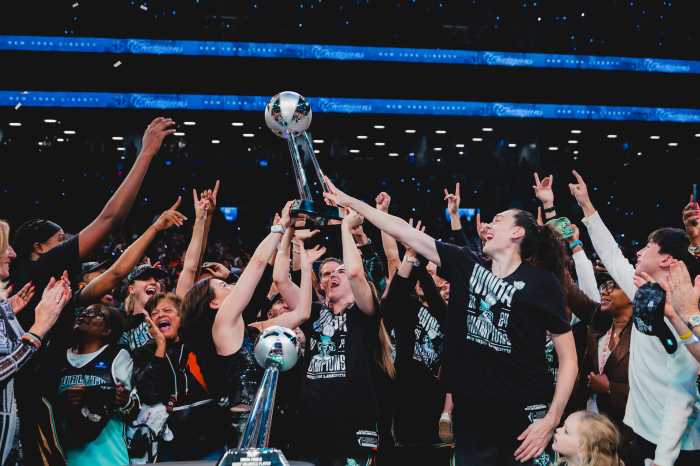An impoverished schoolteacher is in love
with a lovely girl from the country. Her mother is in love with
a philandering doctor. An aspiring playwright is in love with
his lead actress, who runs away with his mother’s lover.
No, this is not a daytime soap opera. These
foolish, sometimes funny individuals go by names like Masha,
Medvedenko, Konstaintin and Trigorin, and they’re characters
in Anton Chekhov’s classic play, "The Seagull," now
on stage at the Gallery Players’ theater in Park Slope.
Written in 1896, "The Seagull"
was first produced in St. Petersburg with such poor results that
Chekhov nearly abandoned writing for the stage. But two years
later, "The Seagull" was one of the first successful
productions at the Moscow Art Theater, and it established Chekhov
as a major dramatist.
Like most of Chekhov’s work, "The
Seagull" is about people who long for happiness and want
to lead useful and meaningful lives but are constantly thwarted
by circumstance, their own personalities and the desires of others.
But in spite of the general pessimistic
attitude of Chekhov’s characters, there is a comic element to
his work. Even as Chekhov sympathizes with the plight of his
forlorn lovers and discouraged artists, he cannot resist making
fun of their foolishness.
Jennifer Ward Evans directs "The Seagull"
with a light touch and more than a touch of wit. Against Kevin
Lock’s painted backdrop of the Russian countryside, Chekhov’s
ordinary people rail at their less than extraordinary fate.
Joshua Zisholtz is Konstaintin, the sniveling
son of the famous actress Arkadina and some unnamed man who apparently
lived in Kiev. He rails and cries, pleads and whines. He makes
us believe the word "nerd" may have Russian origins.
Arkadina is portrayed by Joy Besozzi, with
a perfect combination of hysteria, vanity and self-absorption.
And David Koppel plays Arkadina’s lover,
Trigorin, with such skill that he remains likable until almost
the very end. Trigorin, who is successful in his pursuits of
both women and fame, is a constant source of irritation to Konstaintin,
an aspiring playwright whose first attempt is welcomed with at
best confusion, at worst derision.
Konstaintin seeks comfort in his doomed
love for the stage-struck Nina (Kathryn Zamora-Benson), unaware
that Masha (Ann Burrows), the daughter of his Uncle Sorin’s estate
manager, is just as hopelessly in love with him.
As Konstaintin watches Nina fall victim
to Trigorin’s charms, he shoots a seagull, which he brings her
as a symbol of his wounded heart. Nina is unimpressed, and Konstaintin
unsuccessfully turns his rifle on himself.
The pathos goes on, with Russian angst
driving the plot along at the speed of continental drift, but
with such finely tuned emotional vicissitudes most audiences
will always have the patience to wait it out.
It’s a well-known fact that nothing much
happens in a Chekhov play, and what little action there is happens
mostly off-stage. We know that Trigorin goes fishing, that Konstaintin
goes hunting and attempts suicide, and that people arrive and
depart – often in horribly inclement weather. But all the audience
sees is a bandaged head, the sound of a gun, a dead seagull.
Yet, in the hands of a skilled director
and capable cast, Chekhov is never dull. The deeply insightful
dialogue, the play of emotions, the wild mood swings from the
comic to the tragic more than compensate for the lack of action.
"The Seagull" is a delicate and
difficult play. It is realistic in its depiction of ordinary
people going about their day-to-day tasks and dealing with the
not very unusual problems of life. But it is also highly symbolic.
And this is what makes "The Seagull" so different from
any daytime drama you’ll ever see on television.
The seagull is not only the wounded heart
of a lover. It is also the destroyed aspirations of talented
artists scorned by a world that does not understand their work
or their dreams. It is the life of the timid destroyed by the
predators of the world, who care about nothing more than their
own desire. And in the hands of this ambivalent and ironic playwright,
it is also a bit ridiculous.
Chekhov, at his best, always reminds his
audiences that neither life, nor his characters, nor even his
own plays should be taken too seriously.
The Gallery Players’ production shows a
keen understanding of the dual nature of Chekhov’s writing. Ward
has remained faithful to both the spirit and the word. As a result,
the Gallery Players’ "Seagull" breaks no new ground,
but it does create a human landscape that is a pleasure to watch
unfold.
"The Seagull" plays through
April 8, Fridays and Saturdays at 8 pm, and Sundays at 3 pm at
the Gallery Players [199 14th St., between Fourth and Fifth avenues,
(718) 595-0547]. There will be an additional show on Thursday,
April 5 at 8 pm, and a chance to meet the cast at an "Ask
the Artist" get-together after the April 1 matinee. Tickets
are $15, seniors and children under 10, $10.

























